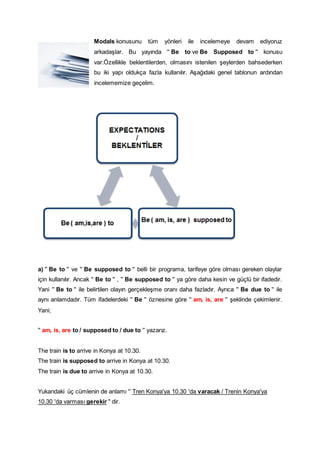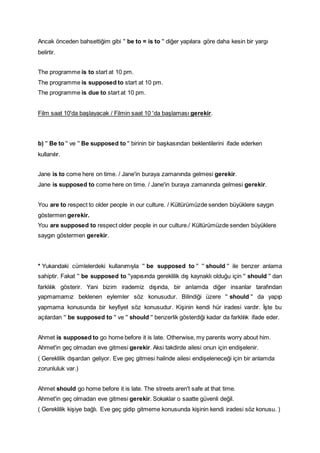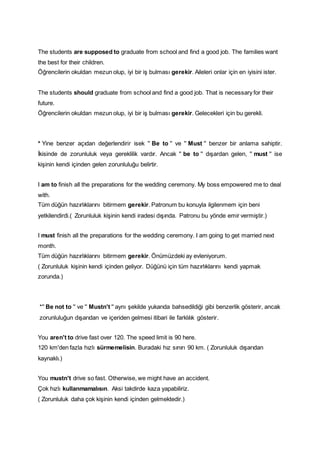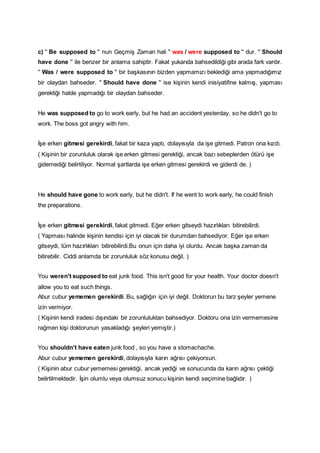Be to and be supposed to
- 1. Modals konusunu tüm yönleri ile incelemeye devam ediyoruz arkadaşlar. Bu yayında '' Be to ve Be Supposed to '' konusu var.Özellikle beklentilerden, olmasını istenilen şeylerden bahsederken bu iki yapı oldukça fazla kullanılır. Aşağıdaki genel tablonun ardından incelememize geçelim. a) '' Be to '' ve '' Be supposed to '' belli bir programa, tarifeye göre olması gereken olaylar için kullanılır. Ancak '' Be to '' , '' Be supposed to '' ya göre daha kesin ve güçlü bir ifadedir. Yani '' Be to '' ile belirtilen olayın gerçekleşme oranı daha fazladır. Ayrıca '' Be due to '' ile aynı anlamdadır. Tüm ifadelerdeki '' Be '' öznesine göre '' am, is, are '' şeklinde çekimlenir. Yani; '' am, is, are to / supposed to / due to '' yazarız. The train is to arrive in Konya at 10.30. The train is supposed to arrive in Konya at 10.30. The train is due to arrive in Konya at 10.30. Yukarıdaki üç cümlenin de anlamı '' Tren Konya'ya 10.30 'da varacak / Trenin Konya'ya 10.30 'da varması gerekir '' dir.
- 2. Ancak önceden bahsettiğim gibi '' be to = is to '' diğer yapılara göre daha kesin bir yargı belirtir. The programme is to start at 10 pm. The programme is supposed to start at 10 pm. The programme is due to start at 10 pm. Film saat 10'da başlayacak / Filmin saat 10 'da başlaması gerekir. b) '' Be to '' ve '' Be supposed to '' birinin bir başkasından beklentilerini ifade ederken kullanılır. Jane is to come here on time. / Jane'in buraya zamanında gelmesi gerekir. Jane is supposed to come here on time. / Jane'in buraya zamanında gelmesi gerekir. You are to respect to older people in our culture. / Kültürümüzde senden büyüklere saygın göstermen gerekir. You are supposed to respect older people in our culture./ Kültürümüzde senden büyüklere saygın göstermen gerekir. * Yukarıdaki cümlelerdeki kullanımıyla '' be supposed to '' '' should '' ile benzer anlama sahiptir. Fakat '' be supposed to ''yapısında gereklilik dış kaynaklı olduğu için '' should '' dan farklılık gösterir. Yani bizim irademiz dışında, bir anlamda diğer insanlar tarafından yapmamamız beklenen eylemler söz konusudur. Bilindiği üzere '' should '' da yapıp yapmama konusunda bir keyfiyet söz konusudur. Kişinin kendi hür iradesi vardır. İşte bu açılardan '' be supposed to '' ve '' should '' benzerlik gösterdiği kadar da farklılık ifade eder. Ahmet is supposed to go home before it is late. Otherwise, my parents worry about him. Ahmet'in geç olmadan eve gitmesi gerekir. Aksi takdirde ailesi onun için endişelenir. ( Gereklilik dışardan geliyor. Eve geç gitmesi halinde ailesi endişeleneceği için bir anlamda zorunluluk var.) Ahmet should go home before it is late. The streets aren't safe at that time. Ahmet'in geç olmadan eve gitmesi gerekir. Sokaklar o saatte güvenli değil. ( Gereklilik kişiye bağlı. Eve geç gidip gitmeme konusunda kişinin kendi iradesi söz konusu. )
- 3. The students are supposed to graduate from school and find a good job. The families want the best for their children. Öğrencilerin okuldan mezun olup, iyi bir iş bulması gerekir. Aileleri onlar için en iyisini ister. The students should graduate from school and find a good job. That is necessary for their future. Öğrencilerin okuldan mezun olup, iyi bir iş bulması gerekir. Gelecekleri için bu gerekli. * Yine benzer açıdan değerlendirir isek '' Be to '' ve '' Must '' benzer bir anlama sahiptir. İkisinde de zorunluluk veya gereklilik vardır. Ancak '' be to '' dışardan gelen, '' must '' ise kişinin kendi içinden gelen zorunluluğu belirtir. I am to finish all the preparations for the wedding ceremony. My boss empowered me to deal with. Tüm düğün hazırlıklarını bitirmem gerekir. Patronum bu konuyla ilgilenmem için beni yetkilendirdi.( Zorunluluk kişinin kendi iradesi dışında. Patronu bu yönde emir vermiştir.) I must finish all the preparations for the wedding ceremony. I am going to get married next month. Tüm düğün hazırlıklarını bitirmem gerekir. Önümüzdeki ay evleniyorum. ( Zorunluluk kişinin kendi içinden geliyor. Düğünü için tüm hazırlıklarını kendi yapmak zorunda.) *'' Be not to '' ve '' Mustn't '' aynı şekilde yukarıda bahsedildiği gibi benzerlik gösterir, ancak zorunluluğun dışarıdan ve içeriden gelmesi itibari ile farklılık gösterir. You aren't to drive fast over 120. The speed limit is 90 here. 120 km'den fazla hızlı sürmemelisin. Buradaki hız sınırı 90 km. ( Zorunluluk dışarıdan kaynaklı.) You mustn't drive so fast. Otherwise, we might have an accident. Çok hızlı kullanmamalısın. Aksi takdirde kaza yapabiliriz. ( Zorunluluk daha çok kişinin kendi içinden gelmektedir.)
- 4. c) '' Be supposed to '' nun Geçmiş Zaman hali '' was / were supposed to '' dur. '' Should have done '' ile benzer bir anlama sahiptir. Fakat yukarıda bahsedildiği gibi arada fark vardır. '' Was / were supposed to '' bir başkasının bizden yapmamızı beklediği ama yapmadığımız bir olaydan bahseder. '' Should have done '' ise kişinin kendi inisiyatifine kalmış, yapması gerektiği halde yapmadığı bir olaydan bahseder. He was supposed to go to work early, but he had an accident yesterday, so he didn't go to work. The boss got angry with him. İşe erken gitmesi gerekirdi, fakat bir kaza yaptı, dolayısıyla da işe gitmedi. Patron ona kızdı. ( Kişinin bir zorunluluk olarak işe erken gitmesi gerektiği, ancak bazı sebeplerden ötürü işe gidemediği belirtiliyor. Normal şartlarda işe erken gitmesi gerekirdi ve giderdi de. ) He should have gone to work early, but he didn't. If he went to work early, he could finish the preparations. İşe erken gitmesi gerekirdi, fakat gitmedi. Eğer erken gitseydi hazırlıkları bitirebilirdi. ( Yapması halinde kişinin kendisi için iyi olacak bir durumdan bahsediyor. Eğer işe erken gitseydi, tüm hazırlıkları bitirebilirdi.Bu onun için daha iyi olurdu. Ancak başka zaman da bitirebilir. Ciddi anlamda bir zorunluluk söz konusu değil. ) You weren't supposed to eat junk food. This isn't good for your health. Your doctor doesn't allow you to eat such things. Abur cubur yememen gerekirdi. Bu, sağlığın için iyi değil. Doktorun bu tarz şeyler yemene izin vermiyor. ( Kişinin kendi iradesi dışındaki bir zorunluluktan bahsediyor. Doktoru ona izin vermemesine rağmen kişi doktorunun yasakladığı şeyleri yemiştir.) You shouldn't have eaten junk food , so you have a stomachache. Abur cubur yememen gerekirdi, dolayısıyla karın ağrısı çekiyorsun. ( Kişinin abur cubur yememesi gerektiği, ancak yediği ve sonucunda da karın ağrısı çektiği belirtilmektedir. İşin olumlu veya olumsuz sonucu kişinin kendi seçimine bağlıdır. )




